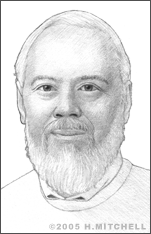Dennis Ritchie
A true trailblazer in the field of computer technology, Dennis MacAlistair Ritchie, born on Sept. 9, 1941 in Bronxville, New York, is credited with the 1972 creation of one of the world’s most popular programming languages, “C.”
Ritchie attended Harvard University where he achieved an undergraduate degree in physics in 1963, and a doctoral degree in applied mathematics in 1968. His father, Alistair Ritchie, had spent many years working for Bell Labs, and the younger Ritchie followed him there in 1967, joining the Bell Labs Computing Sciences Research Center.
The following year Ritchie began working on a joint project involving Bell Labs, General Electric and the Massachusetts Instiute of Technology. The aim of the “Multics” effort, which stands for Multiplexed Information and Computing Service, was to develop a general-purpose computer operating system. Earlier systems were incompatible with one another and designed with singular or limited purposes and tasks in mind; interoperability was virtually impossible.
For his part, Ritchie helped to design a compiler for the language they were using at the time, BCPL, (for Basic Combined Programming Language), for the Multics mainframe machine. British computer scientist Martin Richards developed BCPL in 1966. Ritchie also wrote a compiler for ALTRAN, a language used for symbolic calculation. A “compiler” is a computer program that translates a high-level language program, or source program, into machine language instructions, also called the object, target, or output program.
A colleague of Ritchie’s at Bell Labs, Kenneth Thompson, adapted BCPL into “B” in 1969, as the pair went to work to create the Unix operating system, born in 1970. Early in the development of Unix, Ritchie began modifying B, adding data and syntax characteristics that turned B into the famed C in 1972.
Unix components were at first written in B, but eventually rewritten in C, culminating with the kernel in 1973. Thus, C became the foundation for the system’s portability. Unix was easier to move onto new computers because it was unnecessary to translate the entire operating system for each new computer’s assemble language by hand. It also made Unix - and therefore any machine it was installed into - easily customizable, especially since C was a high-level language that was relatively easy for a skilled programmer to learn.
Many did learn C, and their subsequent modifications to the Unix operating system have made it even more useful and efficient. C became widely used in other contexts as well, in computers of all sizes and for all types of purposes. U.S. and international standards were eventually established, and, of course, C served as the basis for C++, designed by Ritchie’s colleague, Bjarne Stroustrup. C also served as the basis for other languages like Java and JavaScript. And from Unix, operating systems such as BSD and Linux have hit the mainstream as well.
Ritchie has been recognized with a number of awards and honors for his achievements.. He was named Bell Labs Fellow in 1983, and, also that year, he and Thompson won the prestigious Turing Award for their work Unix and general operating systems. He was elected to the U. S. National Academy of Engineering in 1988.
In 1990, Ritchie became head of System Software Research Department in Bell Labs’ Computer Sciences Research Center. His group created the Plan 9 operating system, released in 1995; and the Inferno operating system, unveiled in 1996. In 1999 he and Thompson were both honored with the U.S. National Medal of Technology for their joint efforts in the development of Unix.
Ritchie passed away on October 12, 2011 in Berkley Heights, NJ.


